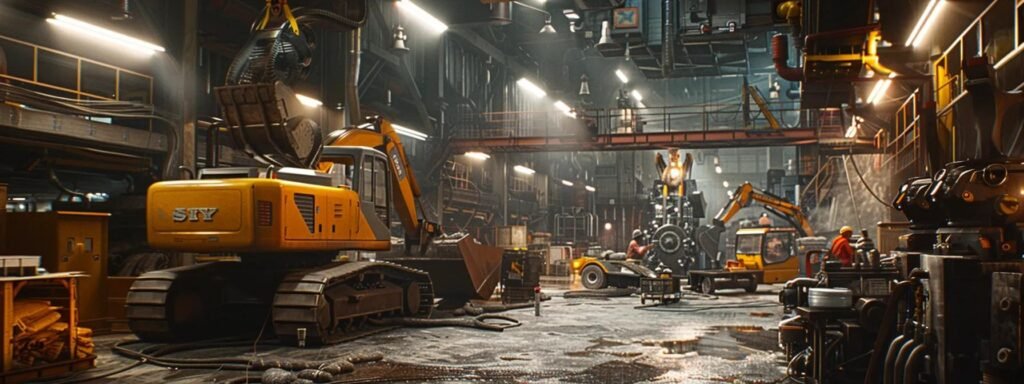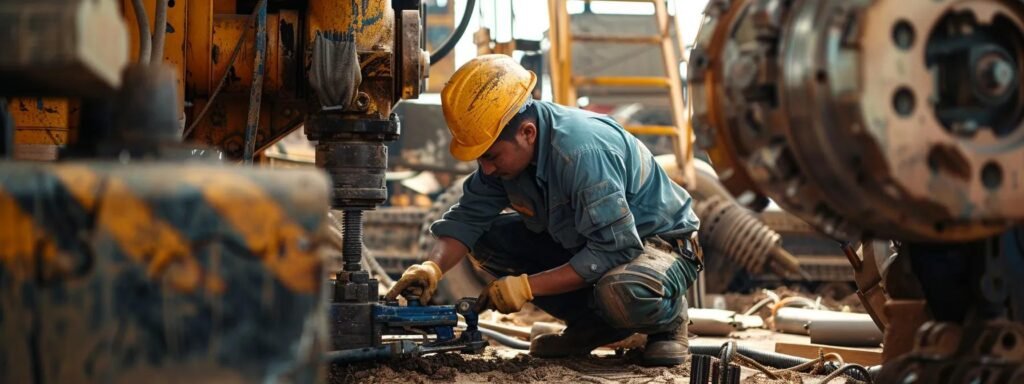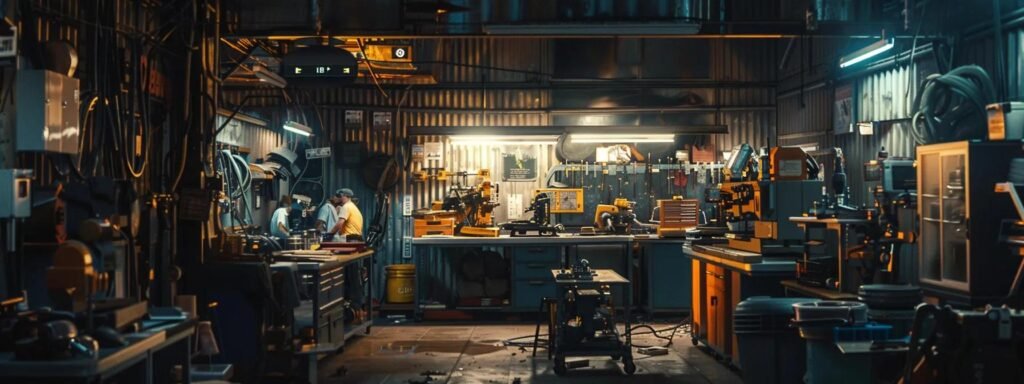
Unexpected Noises or Vibrations:Reduced Horsepower:Fluid Leaks:Warning Lights:Drop in Performance:
Equipment Repair Near Me: Find Trusted Heavy and Construction Equipment Repair Services
Introduction
Finding reliable and efficient equipment repair services is critical for businesses that depend on heavy machinery. When a transmission fails, a diesel engine malfunctions, or hydraulics break down, downtime can sharply reduce productivity and cause major financial losses. This guide helps you locate and select top-quality heavy equipment repair services in your area. It explains the types of repairs available, factors affecting repair costs, and the benefits of preventative maintenance. You will also gain insights into on-site versus in-shop repairs, the equipment brands supported by local technicians, and how mobile repair services quickly address emergencies. The following sections cover everything you need to know about equipment repair—from initial considerations to final cost analysis—to help improve machine uptime and overall operational efficiency.
Transitioning into the main content, the article explains available repair services and the warning signs that your heavy equipment needs servicing, ensuring you maintain your machines with minimal downtime.
What Equipment Repair Services Are Available Near Me?

Local equipment repair services cover a wide range of heavy and construction machinery repairs. Providers often specialize in diesel engines, transmission systems, pump malfunctions, braking systems, and hydraulic faults. Since machine downtime directly affects productivity, efficient scheduling of service is essential—especially for critical equipment like combine harvesters and loaders.
Which Types of Heavy Equipment Do Repair Services Cover?
Local repair companies typically serve various types of machinery including excavators, bulldozers, cranes, loaders, and backhoes. They also work on specialized machines such as combine harvesters, track loaders, and pump units used in construction and agriculture. These services extend to critical engine and transmission components that ensure power delivery and mobility. With deep technical knowledge of multiple brands and the latest innovations such as electronic control systems, expert technicians help maintain optimal performance while reducing operational risks.
What Are the Common Repair Services Offered?
Common repair services include: – Engine Diagnostics and Repair: Identifying and correcting issues with engine performance. – Transmission Repair: Fixing or replacing malfunctioning components. – Pump and Hydraulic Servicing: Maintaining pumps, hydraulics, and related systems. – Brake Maintenance: Ensuring safe and effective braking. – Electronic System Troubleshooting: Diagnosing issues with modern control systems.
Providers often offer customized repair plans based on equipment age, usage patterns, and repair history. Many also include emergency repairs during off hours to return heavy equipment to service quickly.
How Do on-Site and in-Shop Repairs Differ?
On-site repairs involve technicians coming to your facility, which reduces transport risks and minimizes downtime. This method is ideal for quick fixes or when immediate service is needed. However, complex diagnostics or repairs on major components like transmissions or diesel engine parts may be better handled in fully equipped shops. In-shop repairs typically offer access to advanced tools and a controlled environment, which can result in a more precise repair at a lower cost. While on-site services may carry extra travel fees, they save time by reducing equipment downtime.
Which Equipment Brands Are Supported Locally?
Local repair services usually support a broad range of major outdoor equipment brands such as Caterpillar, John Deere, Komatsu, Volvo, and Hitachi. They benefit from established relationships with manufacturers, which provide technical manuals, genuine parts, and repair tips. Technicians are often certified to handle both older models and the latest systems, ensuring that specialized tasks like engine re-calibration or hydraulic repairs are performed correctly. This local expertise guarantees that, regardless of the complexity of the repair, your equipment can be restored to peak functionality.
How to Choose the Best Equipment Repair Service Near Me?
Choosing the right equipment repair service is key to maintaining operational efficiency. The decision should be based on factors like reputation, technician qualifications, cost efficiency, and turnaround time. A quality provider not only fixes current issues but also offers advice on how to reduce future breakdowns through proactive maintenance.
What Factors Should I Consider When Selecting a Repair Provider?
When selecting a repair provider, consider: – Experience and Certifications: Look for providers experienced with your specific machine types and brands. – Customer Reviews and Testimonials: These offer insights into reliability and quality of service. – Response Time and Availability: Ensure the provider offers emergency repair services. – Transparent Pricing: Request detailed estimates that clearly separate parts, labor, and any additional fees. – Service Options: Providers that offer both on-site and in-shop repairs allow for flexible solutions depending on the situation.
What Questions Should I Ask Equipment Repair Technicians?
Ask the following: – “What certifications do your technicians hold?” – “Can you provide examples of similar repairs you have completed?” – “What is your typical turnaround time for repairs like transmission fixes or diesel engine maintenance?” – “How do you handle emergency on-site repairs?” – “Do you offer warranties or guarantees on parts and labor?”
Clear answers to these questions help ensure you choose a provider committed to quality work and long-term equipment performance.
How Important Is Local Expertise in Equipment Repair?
Local expertise is vital as nearby repair services can respond faster and offer tailored maintenance plans that consider regional conditions. Local technicians understand issues related to weather, operating conditions, and part availability. Their familiarity with the community also strengthens trust and reliability, making them more effective at reducing downtime through prompt and personalized service.
What Are the Signs That My Heavy Equipment Needs Repair?

Recognizing early signs of malfunction can save significant time and money. Look out for: –
These may indicate mechanical issues. –
A sign that the engine or transmission is struggling. –
Often a signal of hydraulic or lubrication system problems. –
Illumination on digital control panels can indicate critical issues. –
Overall reduced capability may signal wear and tear.
Regular inspections and monitoring using built-in sensors can help detect issues early, ensuring repairs are made before significant damage occurs.
What Are Common Problems in Excavators, Bulldozers, and Cranes?
Heavy machines often face: – Hydraulic Fluid Leaks: Common in excavators and cranes. – Overheating Engines: Indicative of potential engine or cooling system issues. – Transmission Malfunctions: Affecting smooth power delivery. – Wear on Critical Components: Such as bucket teeth on excavators or worn hydraulic seals on bulldozers. Routine checks and preventive maintenance are essential to catching these common issues before they cause severe disruptions.
How Can I Detect Equipment Failure Early?
Early detection involves: – Regular Maintenance Checks: Scheduled inspections help identify wear and unusual conditions. – Real-Time Monitoring: Sensors that track engine parameters, hydraulic pressure, and transmission performance. – Comprehensive Visual Inspections: Keeping a detailed log of maintenance activities can reveal gradual performance declines. Using these techniques helps ensure that minor issues do not escalate into major failures.
When Should I Schedule Preventative Maintenance?
Follow the manufacturer’s guidelines—typically every 250 to 500 operating hours or every six months. In harsh environments or with heavy usage, more frequent maintenance may be necessary. Preventative maintenance includes tasks such as fluid checks, filter replacements, and detailed system diagnostics. This regular servicing not only extends equipment lifespan but also reduces repair costs by preventing unexpected breakdowns.
How Much Does Equipment Repair Near Me Typically Cost?
Equipment repair costs vary based on the type of repair, machine brand, and repair method. Pricing factors usually involve labor rates, the cost of replacement parts, and the repair’s complexity. On-site repairs might incur additional travel fees, while in-shop repairs may offer more competitive rates due to better facilities. Requesting clear, detailed estimates helps you compare offers accurately and plan your maintenance budget effectively.
What Factors Influence Equipment Repair Pricing?
Key factors include: – Machine Age and Condition: Newer models may require more specialized parts. – Extent of Wear and Damage: More significant damage can increase costs. – Labor Rates and Regional Demand: Prices vary based on local market conditions. – Emergency or Off-Hours Service: Repairs done outside normal hours may add extra fees. Understanding these elements ensures that you receive fair pricing and avoid unexpected expenses.
How Do on-Site Repairs Compare Cost-Wise to in-Shop Repairs?
On-site repairs reduce downtime by bringing the service to your location but may cost more due to travel expenses and limited on-site resources. In contrast, in-shop repairs benefit from advanced tools and controlled conditions, which can lower overall costs. Weigh the urgency of the repair against potential savings when deciding between on-site and in-shop services.
Are Preventative Maintenance Programs Cost-Effective?
Yes, preventative maintenance is generally cost-effective. Regular upkeep prevents minor issues from escalating into major, expensive repairs. Many providers offer service agreements or maintenance contracts that include routine inspections, priority emergency service, and discounted rates. Such programs not only keep equipment running efficiently but also lower the total cost of ownership over time.
Where Can I Find Fast and Reliable Mobile Equipment Repair Services Near Me?

Mobile equipment repair services are an excellent option for businesses requiring quick, on-site fixes. These services send qualified technicians directly to your facility, minimizing downtime. This is especially beneficial in construction and agriculture where delays can halt projects. With computer diagnostics and essential repair tools, mobile technicians can often resolve issues immediately without the need to transport heavy machinery.
What Are the Advantages of Mobile Equipment Repair?
Mobile repair services offer: – Reduced Downtime: Quick response means faster return to operation. – Accurate On-Site Diagnostics: Technicians can assess the equipment in its operating environment. – Enhanced Customer Service: Personalized, flexible scheduling tailored to your needs. – Cost-Effective Solutions: Although there may be extra fees, the reduction in downtime can make mobile repairs the better financial option for urgent issues.
Which Equipment Types Are Best Suited for on-Site Repairs?
On-site repairs are ideal for equipment that is large or difficult to transport, including: – Large Excavators and Bulldozers– Cranes and Heavy Loaders– Machines with Integrated Diesel Engines and Complex Hydraulic SystemsFor such equipment, on-site service can quickly resolve issues like brake problems or transmission faults without the delay and cost of moving the machine.
How Quickly Can Mobile Technicians Respond Locally?
Response times for mobile repairs typically range from one to four hours, depending on the provider’s proximity and the repair’s urgency. Many repair companies offer 24/7 services, ensuring that emergencies are handled promptly. Fast technician response not only restores machine uptime but also builds customer confidence in the service.
What Are the Benefits of Preventative Maintenance for Heavy Equipment?
Preventative maintenance involves regularly scheduled servicing to prevent unexpected breakdowns and extend the lifespan of heavy machinery. Instead of waiting for a failure, regular check-ups and minor repairs keep your equipment running at optimal efficiency. Benefits include: – Reduced Downtime: Regular maintenance prevents major failures. – Extended Equipment Life: Routine care helps maintain performance and reduces wear. – Improved Productivity: Well-maintained equipment operates more efficiently, reducing delays and lower repair costs over time.
How Does Preventative Maintenance Extend Equipment Lifespan?
By routinely replacing filters, lubricants, and worn parts, preventative maintenance helps the equipment avoid the stresses that lead to failure. This proactive approach maintains fuel efficiency and performance, which can significantly extend the life of heavy machinery. It also helps maintain higher resale values if the equipment is eventually upgraded or sold.
What Services Are Included in Preventative Maintenance Programs?
Common services include: – Oil and Filter Changes– Lubrication of Moving Parts– Hydraulic Fluid Checks– Engine and Transmission Diagnostics– Visual Inspections for Wear and LeaksSome providers also use advanced diagnostics with sensors to give real-time data, offering bundled service packages that ensure all components—from pump to transmission—operate at their best.
How Often Should Preventative Maintenance Be Performed?
Generally, heavy equipment should be serviced every 250 to 500 operating hours or at least every six months. In more demanding or harsh operational environments, more frequent checks may be necessary. Sticking to a structured maintenance schedule not only keeps machinery efficient but also helps forecast when major repairs might be needed, allowing for better budgeting and resource allocation.
Which Locations Offer the Best Equipment Repair Near Me?

The quality and availability of equipment repair services can vary by location. Industrial hubs and technologically advanced cities often have a higher concentration of repair facilities with experienced technicians and transparent pricing. Urban centers typically offer both on-site and in-shop repair options, ensuring that emergency and routine service needs are met promptly. Customer reviews, long-term service agreements, and a strong local reputation are good indicators of a high-quality repair provider.
What Equipment Repair Services Are Available in Anytown and Surrounding Areas?
In many urban settings such as Anytown, repair services provide a comprehensive suite of solutions including transmission repairs, pump and hydraulic servicing, and engine diagnostics. These providers serve both the immediate area and surrounding suburban or rural regions. They often offer maintenance contracts for regular preventive service along with emergency support, ensuring that customers experience minimal downtime and maximum efficiency.
How Do Location-Specific Repair Services Differ?
Differences in repair services can be seen in: – Expertise and Specialization: Urban centers may have more specialized technicians due to higher service demand. – Response Times: Proximity often means faster response in industrial regions. – Pricing Variations: Overhead costs can influence pricing, with smaller or rural providers offering more personalized but sometimes slower service. Such differences make it important to check local reviews and compare repair options to find a service provider that matches your needs.
Where Can I Read Customer Reviews and Testimonials for Local Repair Providers?
Customer feedback is widely available on platforms like Google Reviews, Yelp, and industry-specific directories. Many repair providers also showcase testimonials and detailed case studies on their websites. Reviewing multiple sources of feedback helps gauge a provider’s reliability, response time, and overall service quality before making a decision.
Frequently Asked Questions
Q: How can I quickly schedule service for heavy equipment repairs? A: Contact a repair provider with emergency mobile repair capabilities. Many companies offer online request forms and 24/7 hotlines, ensuring a rapid dispatch of technicians who support your specific machine type and brand.
Q: What causes heavy machinery components like transmissions or pumps to fail? A: Failures are often due to wear and tear, inadequate lubrication, and contamination in fluid systems. Overuse, environmental stress, and insufficient maintenance can accelerate these issues, which is why regular inspections are vital.
Q: Are mobile repair services more expensive than in-shop repairs? A: While mobile repairs might incur extra charges for technician travel and on-site logistics, they minimize downtime by fixing equipment on location. When downtime costs are factored in, mobile repairs can be a cost-effective option for urgent issues.
Q: How often should heavy equipment receive preventative maintenance? A: Typically, maintenance should be performed every 250 to 500 operating hours or every six months, but harsh operating conditions may require more frequent service. Following manufacturer recommendations ensures longevity and optimal performance.
Q: What should I look for in customer reviews for equipment repair services? A: Look for feedback that mentions responsiveness, quality of service, technician expertise, and transparent pricing. Reviews highlighting minimal downtime and effective communication indicate a reputable provider.
Q: Can regular maintenance really prevent costly repairs on heavy equipment? A: Yes, regular maintenance addresses minor issues before they escalate, reducing the risk of major breakdowns and saving on overall repair costs.
Q: Do all local repair services support the same equipment brands? A: Most reputable services support a wide range of popular heavy equipment brands like Caterpillar, John Deere, Komatsu, and Volvo. However, it is advisable to confirm that the provider has experience with your specific machinery.
Final Thoughts
Accessible and high-quality equipment repair services are essential for maintaining machine performance and minimizing costly downtime. By understanding different repair types, comparing on-site versus in-shop options, and selecting a reputable local provider, businesses can ensure dependable service that meets their operational needs. The benefits of preventative maintenance—such as extended equipment lifespan, improved productivity, and reduced repair costs—make proactive maintenance a smart investment. Embrace regular maintenance and trusted repair services to optimize productivity and protect your heavy equipment investments.
